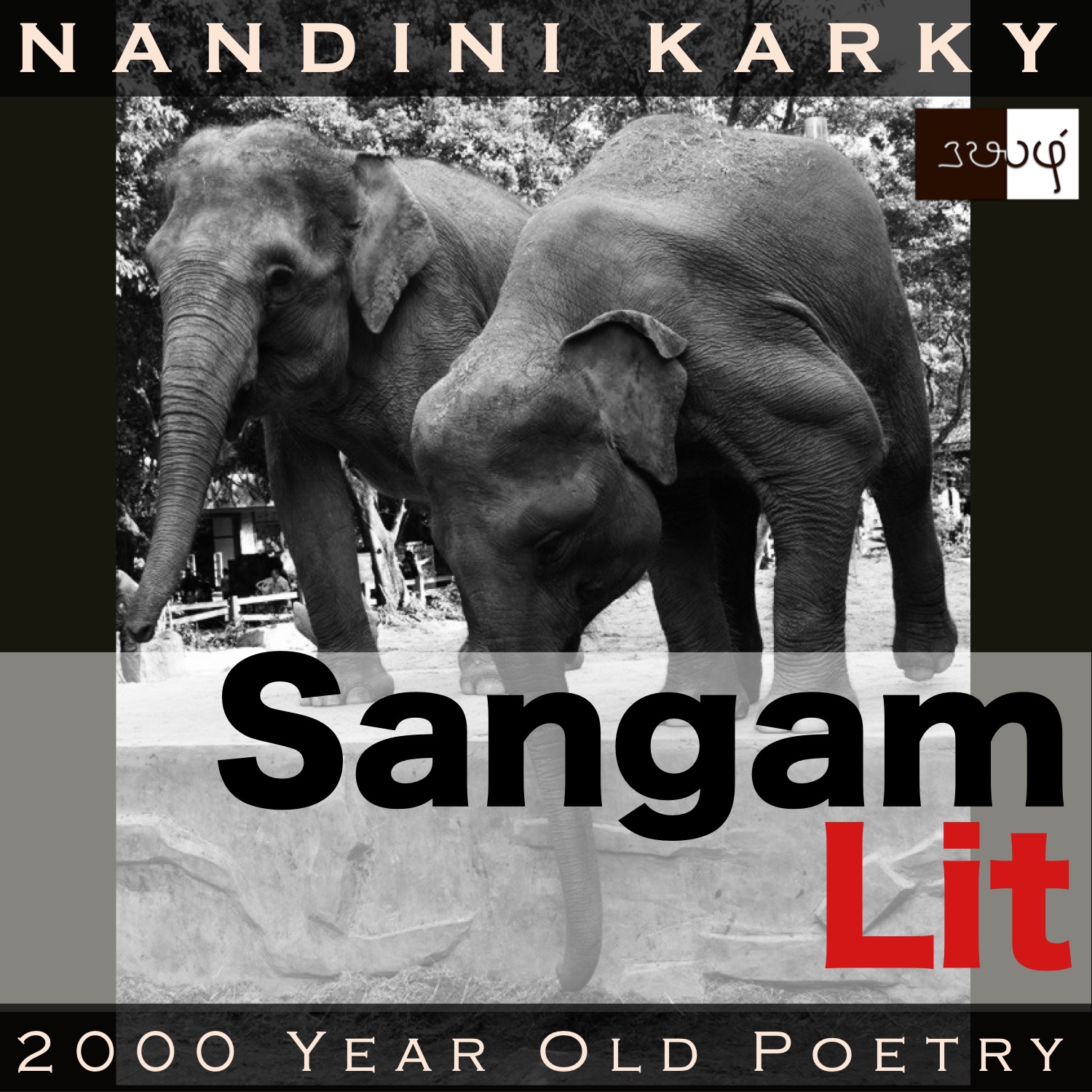Podcast: Play in new window | Download
Subscribe: Apple Podcasts | Spotify | Amazon Music | Android | iHeartRadio | TuneIn | RSS | More

In this episode, we perceive issues in inner life reflected in scenes of wildlife, as portrayed in Sangam Literary work, Natrinai 232, penned by Mudhuvenkannanaar. Set in the mountain country of ‘Kurinji’, the verse speaks in the voice of the confidante to the man, bidding him to stay the night at the lady’s house, as he prepares to leave after his tryst by day.
சிறு கண் யானைப் பெருங் கை ஈர்-இனம்
குளவித் தண் கயம் குழையத் தீண்டி,
சோலை வாழை முணைஇ, அயலது
வேரல் வேலிச் சிறுகுடி அலற,
செங் காற் பலவின் தீம் பழம் மிசையும்
மா மலை நாட!-காமம் நல்கென
வேண்டுதும்-வாழிய! எந்தை, வேங்கை
வீ உக வரிந்த முன்றில்,
கல் கெழு பாக்கத்து அல்கினை செலினே.
As it begins, the poem sketches for us, ‘an elephant with small eyes and long trunk’ in ‘சிறு கண் யானைப் பெருங் கை’. Following this, we see ‘ஈர்-இனம்’ meaning ‘two groups’ in a significant reference separating the male and female elephants as two different groups. The word ‘குளவி’ is said to mean a fragrant plant called as ‘patchouli’, used in incenses and perfumes over centuries. The phrase ‘வேரல் வேலிச் சிறுகுடி அலற’ packs within it, a lot of theatrics, for it means ‘making the bamboo-fenced, little village scream’ and hints at man-animal conflict that exists even today between villagers and elephants in the Western ghats and in North-eastern states. ‘செங் காற் பலவின் தீம் பழம்’ meaning ‘the red-trunked jackfruit tree’s sweet fruit’ makes our mouths water. The verse ends with ‘அல்கினை செலினே’ meaning ‘stay and then go’! Taking that as an invitation, let’s delve into this mountain song.
The man and lady had been leading a love relationship and the man trysts with the lady in the mountain fields and forests by day. One day, as he prepares to leave, the confidante goes to him and says, “The small-eyed, long-trunked elephants, both male and female, play with each other in the cool pond, muddying it with patchouli flowers. Then, disliking the plantains in the orchard, they tread forth to the bamboo-fenced little hamlet nearby and making the village folk there scream in terror, they feed on the sweet fruit of the red-trunked jackfruit tree. Such scenes are to be found in the great mountains of your domain, O lord! Here’s a plea to you to shower your love. May you live long! In father’s courtyard in the mountain village, covered with the fallen flowers of the kino tree, why don’t you stay the night and then go?” With these words, the confidante urges the man to seek the lady’s hand in marriage.
Really? I hear you ask. All the confidante seems to be doing is to sweetly ask the man to stay the night at the lady’s house. But how then, is she conveying to the man, this message of formalising his union with the lady? For that, we need to know the socio-cultural practices then. Before we go there, let’s first relish the scenes in the man’s mountain country. We see an elephant and its mate splashing and playing in the pond and in their joy, they muddy the pond with the flowers of patchouli bushes growing in the vicinity. A scene to delight the senses of sight and smell! After their play, the elephants decide to have a bite to eat and like privileged children, they turn up their long noses at the plentiful plantain fruits hanging in clusters in the grove and walk on, with other plans in mind. They then reach the bamboo-fenced mountain village. Note how the little village is naturally protected by the thicket of bamboo growing there and this offers an instance of humans living in harmony with their natural world. Returning to the scene, we see these elephants invading this village just to feed on the sweet fruits of the jackfruit tree. Thankfully, unlike children of today who shun fruits and turn to fast food, our elephants are keeping their culinary interests in the fruit family! Fed to the full with sweet fruits, the elephants are happy but the people in that hamlet are worried by the presence of these giants and they run to safer spots, screaming. The confidante narrates this National-Geographic-worthy wildlife documentary only to describe the man’s mountain country, or that’s what she says outwardly!
Before we unearth metaphors, let’s hear the rest of what the confidante has to say. She simply pleads to the man to shower his love on the lady a little longer. The way to do this is to come to their father’s house, where kino flowers spread like a carpet on the front yard, and stay the night there. How welcoming indeed! To us, it appears so but back then, it would make eyebrows rise. This is because tradition forbid a man to stay the night at the lady’s house before the wedding formalities were over. Even today, in many Tamil villages, the groom’s family has a tradition of not having a meal at the bride’s house before finalising the wedding. Ancient traditions continue to echo in subtle ways! So, in asking the man to stay the night, the confidante is issuing an impossible proposal. What she means is to be found in the elephant scene in the man’s country. Like the elephants, the man and lady have relished each other’s company. Now, like how those elephants dislike the abundant plantains, they too must give up this temporary trysting. And then, making the slanderous village women scream in terror, they must lead a happy, married life, akin to the sweetness of that jackfruit in the elephants’ mouths. Thus, with this picturesque scene and positive words, the confidante nudges the man in the direction of permanent happiness.




Share your thoughts...